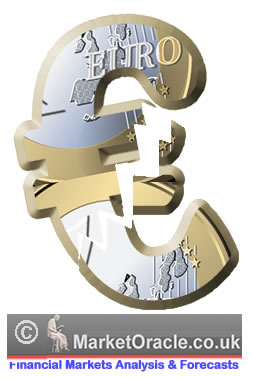It’s Time to Stop Putting a Patch on the Euro
Currencies / Euro Mar 16, 2017 - 02:43 PM GMTBy: Rodney_Johnson

 Andreas Georgiou can’t catch a break.
Andreas Georgiou can’t catch a break.
The Greek statistician moved back to his home country in 2010, at age 50, to help right the financial ship. He left Washington, where he had spent 21 years working for the International Monetary Fund, to take over the agency that reports Greece’s financial health.
Part of the problem with Greece is that no one knows exactly how big their problems are, since the numbers weren’t exactly accurate.
 Georgiou quickly realized that the country’s budget deficit in 2009 wasn’t 6% of GDP, as Greece’s statistics service had previously said. Or even 10%. He revealed to the world that it was closer to 15%. His calculations followed accounting procedures required of all Eurozone members.
Georgiou quickly realized that the country’s budget deficit in 2009 wasn’t 6% of GDP, as Greece’s statistics service had previously said. Or even 10%. He revealed to the world that it was closer to 15%. His calculations followed accounting procedures required of all Eurozone members.And that was the problem.
His countrymen arrested him, accusing him of overstating the financial woes, leading to austerity and hardship. He could stand the name-calling and personal threats, but when strangers started threatening his daughter, he called it quits and returned to the U.S. where he teaches.
But his troubles aren’t over. Every time his case comes up – and is dismissed, because the accusations against him are bogus – the judge allows for more investigation. So prosecutors simply refile, hounding a man for telling the truth.
That’s the problem with the euro. It’s based on a lie that bankers and politicians keep repeating.
Namely, that very different countries, with different business cycles and views of credit, can all use a common currency without any distortion. Right.
These people have been invading and killing each other for centuries, they speak different languages and have wildly different governing structures. It was never going to work.
But everyone got something out of the arrangement, at least for a little while.
Stronger countries like France and Germany tied their fate to weaker countries like Italy and Greece because it put a lid on their currency, which helped exports.
Weaker countries hitched their wagons to stronger countries because it gave them a lower cost of capital when selling government bonds and making private loans. Car loans in Italian lira carried a much higher interest rate than Italian car loans in euros right after Italy joined the common currency, even though the backing was ostensibly the same.
It was perfect! Right up until it wasn’t.
The Greeks lie about their finances and carry billions of dollars of bad debt.
The Germans refuse to borrow, wanting to save for the future instead.
The Italians pray for a growth miracle to bail out their ailing banks.
If the euro didn’t exist, then the Greek currency would rightfully be in the toilet, the German currency would be the most expensive on the planet, and every other euro member would be somewhere in between.
On the euro, everyone that uses it is holding hands, angry at each other and demanding accountability that will never come.
The powder keg will blow up when a weak link, like Greece or Italy breaks and leaves the euro, or a nationalist like Marine Le Pen in France pulls the plug for political reasons.
The currency of weak countries will immediately fall in value.
When the dust settles, the euro will contain Germany and a few stragglers, and it will soar in price, reflecting the real value of the German economy.
We’ll be right back where we started, with investors correctly doubting everything financial that comes out of Greece and Italy, and the Germans struggling to hold down their currency so they can keep the BMWs and Mercedes’ rolling out the export door.
As difficult as the adjustment will be internally for each country, it will be even worse for foreign central banks.
Those holding euros will have to choose how much of each currency they want to buy as reserves. Or, they could take the easier path. Buy dollars.
All of the craziness I expect on the Continent points to one thing – a stronger U.S. dollar. It won’t reflect a robust U.S. economy or tranquil U.S. politics. Instead, it will represent a bunch of scared investors looking for a safe haven for their assets.
The biggest shame of it all is that this ugly process will have taken a decade to unfold, and will have stolen untold billions, if not trillions of dollars from investors in the form of artificially low and even negative interest rates as central bankers tried to hold the euro together.
Better to rip off the Band-Aid quickly, like Georgiou did, and be done with it.
Rodney
Follow me on Twitter ;@RJHSDent
By Rodney Johnson, Senior Editor of Economy & Markets
Copyright © 2017 Rodney Johnson - All Rights Reserved Disclaimer: The above is a matter of opinion provided for general information purposes only and is not intended as investment advice. Information and analysis above are derived from sources and utilising methods believed to be reliable, but we cannot accept responsibility for any losses you may incur as a result of this analysis. Individuals should consult with their personal financial advisors.
© 2005-2022 http://www.MarketOracle.co.uk - The Market Oracle is a FREE Daily Financial Markets Analysis & Forecasting online publication.


